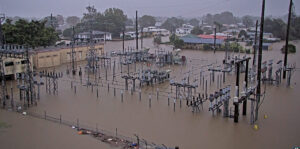The house always wins: Why we can’t insure our way out of the climate crisis

It is time for the Australian government to admit we can’t insure our way out of the climate crisis our fossil fuel exports do so much to cause.
The scientific reality is that sea level rise and increased storm damage will make heavily populated parts of Australia uninhabitable, and the economic reality is that houses in those areas will be uninsurable.
It is impossible to get insurance against likely events.
The only reason an insurance company will insure your car is they know it is unlikely that you will crash it. That’s why no matter how much you are willing to pay, the company won’t insure your car if you have an accident while drink driving.
Put simply, insurance is a gamble, and your premium is determined by the odds of a payout and the size of the catastrophe.
When you insure your house, you are betting that something bad is going to happen and the insurance company is betting that it won’t.
At the end of the year if you do not crash your car or burn your house down you will probably feel good about your choices, but not nearly as good as your insurer who got a few thousand dollars from you in exchange for your peace of mind.
But insurance companies don’t make risky bets. They know that there is only about a one in 600 chance you will have a house fire, which is precisely why they are happy to bet you won’t.
But see what happens if you try ringing them to insure your car against hail damage after hail has been forecast. Hint, no chance.
Insurers don’t make big bets either.
While you might think them paying you $500,000 if your house burns down is a big bet, for an insurance company with tens of billions in annual revenue that’s a rounding error.
But if the Lucas Heights nuclear reactor in Sydney blew up, and a quarter of Sydney had to be evacuated, that would really sting an insurance company – which is why every home insurance policy in Sydney has fine print saying the policy doesn’t cover nuclear accidents.
Just like casinos have a maximum bet to avoid the risk of a lucky billionaire sending them bankrupt, insurance companies won’t insure against catastrophes like war, nuclear fallout or, in coming decades, climate induced floods, storms and bushfires.
Simply put, the house always wins.
While the profits of insurance companies and the ways they treat consumers should always be carefully scrutinised, it makes no sense to blame the industry for charging higher premiums to insure against more likely and destructive storms and fires.
Likewise, it makes no sense for governments to keep pretending that there is any role for the insurance industry in protecting low-lying communities against flood damage.
The latest inconvenient truth is that, just like bookmakers won’t take bets on a one-horse race, insurers will never offer insurance to protect against inevitable sea level rise and floods. If we try to make them, they will charge those with in no danger of flooding a fortune.
One of the least understood features of the insurance industry is how short term its bets actually are.
Many environmentalists have placed a lot of faith in the power of the insurance industry to push for ambitious climate policy without realising that insurers have a much simpler way to protect their profits. Stop offering some forms of insurance.
While someone who has insured their home with the same company for 50 years and never made a claim might think that the insurer will be there for them if something bad happens in the future, in reality the company gets to decide every year if it wants to stick around or leave you to look after yourself.
We can no more rely on insurers to protect us from floods than we can expect Coles or Woolworths to protect us from famines.
Australia Institute research found more than two million people are already uninsured or underinsured. According to science, if countries like Australia keep opening new gas and coal mines the cost of catastrophes – and insurance – will rise rapidly.
Financial Services Minister Daniel Mulino is spot-on to highlight that the rapidly rising cost of home insurance is “an opportunity for us to have a rethink about regulatory settings”.
But protecting Australians from the cost of catastrophic climate change is going to take a lot more than tinkering with regulatory settings.
If the Albanese government is genuinely worried about the costs of insurance, it needs to rapidly introduce a ban on new gas and coal mines, abolish expensive fossil-fuel subsidies and stop giving away export gas for free.
This will slow the rate of climate change and fund the enormous cost of adapting to the sea-level rise that is already locked in.
While successive Australian governments have tried hard to suggest that fossil fuels exports don’t harm Australia, in reality no matter where in the world our coal and gas is burned it warms our climate, causes sea levels to rise and, in turn, will make millions of Australian houses uninsurable.
Denying the inevitable costs of climate change is no different to denying the science of climate change.
– Dr Richard Denniss, Executive Director of the Australia Institute
Between the Lines Newsletter
The biggest stories and the best analysis from the team at the Australia Institute, delivered to your inbox every fortnight.
You might also like
Climate crisis escalates cost-of-living pressures
A new report has found direct connections between the climate crisis and rising cost-of-living pressures. Failure to lower emissions now will only aggravate the crisis, with each moment of inaction compounding the pressure on households.
‘Whinge and win’: We mustn’t mistake loudest voices for a majority
One of my first journalism jobs was at a regional newspaper with a printing press attached. As a baby journalist, it was magical – you could see your front page story printed in front of you before it was bundled and sent out on trucks to become the next day’s news.
What kind of country do you want? | Between the Lines
The Wrap with Amy Remeikis What Peter Dutton and the Coalition are offering Australian voters is a fiction. It’s headlines without substance, chimeras and half-truths that never stand up to scrutiny, but comprehensively misdirects the media’s gaze. The nation has been in election mode since the beginning of the year, when Anthony Albanese used his




